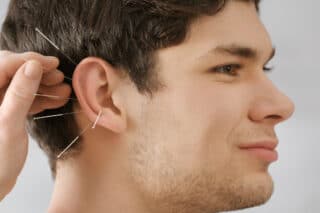
Wholelife Chinese Medicine & Acupuncture
416 Hungerford Drive
Suite 300
Rockville, MD 20850

More Acupuncture Articles
Acupuncture For Rhinitis and Asthma

Acupuncture is an ancient Chinese practice that has gained popularity in the Western world over the past few decades. It involves the insertion of fine needles into specific points on the body to stimulate healing and promote balance. Acupuncture has been found to be effective in treating a variety of conditions, including rhinitis and asthma.
Rhinitis is a condition that causes inflammation of the nasal passages, resulting in symptoms such as congestion, runny nose, sneezing, and itching. There are two main types of rhinitis: allergic and non-allergic. Allergic rhinitis is caused by an immune response to allergens such as pollen, dust, and animal dander. Non-allergic rhinitis can be caused by irritants such as smoke, pollution, and strong odors.
Asthma is a chronic respiratory condition characterized by inflammation and narrowing of the airways, which makes it difficult to breathe. Asthma symptoms can include coughing, wheezing, chest tightness, and shortness of breath. Asthma can be triggered by a variety of factors, including allergies, exercise, cold air, and stress.
Acupuncture has been found to be effective in treating both rhinitis and asthma. According to traditional Chinese medicine, these conditions are caused by imbalances in the body’s energy or “qi.” Acupuncture works by stimulating specific points on the body to restore balance and promote healing.
In a study published in the journal Allergy, researchers found that acupuncture was effective in reducing symptoms of allergic rhinitis. Participants who received acupuncture reported significant improvements in nasal congestion, runny nose, and itching compared to those who received a sham treatment. Another study published in the Journal of Alternative and Complementary Medicine found that acupuncture was effective in reducing symptoms of non-allergic rhinitis, including congestion, runny nose, and sneezing.
Acupuncture has also been found to be effective in treating asthma. In a study published in the Journal of Allergy and Clinical Immunology, researchers found that acupuncture was effective in reducing symptoms of asthma and improving lung function. Participants who received acupuncture reported significant improvements in coughing, wheezing, and shortness of breath compared to those who received a sham treatment.
In addition to its therapeutic benefits, acupuncture is also a safe and non-invasive treatment option for rhinitis and asthma. Unlike medication, which can have side effects and may not be effective for all patients, acupuncture has minimal side effects and can be tailored to each patient’s individual needs.
Acupuncture is an effective and safe treatment option for both rhinitis and asthma. If you suffer from these conditions and are looking for a natural and non-invasive treatment option, acupuncture may be worth considering. Consult with a licensed acupuncturist to see if acupuncture is right for you.

















